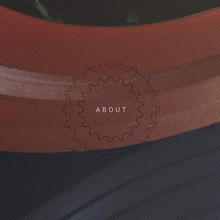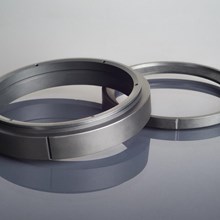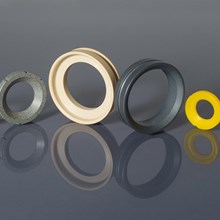The importance of high-quality valve seats can't be over-emphasised since failure can be costly, inefficient and time-consuming when resolving any issues and in the most extreme environments explosive and life threatening. There are many reasons why valve seats fail; read on to find out the most common:
1. Poor material choice
Various plastic materials are used in the manufacture of valve seats. Choosing the wrong material for the required application can lead to failure. Different applications and operating conditions place different requirements on the valve seat material. Prior to choosing a material, it's important to study the physical properties of the available materials to ensure the most suitable option is chosen for a particular application. We provide valve seats manufactured from a range of materials including PTFE, PEEK and Vespel to name a few.
2. Poor seat design
The valve seat is the most critical component of any valve. Simply, if it doesn’t work, the valve doesn’t work. Consequences can range from minimal leakage or shortened life span to catastrophic failure. Depending on the media and environment this can have explosive and life-threatening consequences
3. Poor soft seat carrier design
Many valves utilising soft seats use an outer metallic seat carrier with the valve seat insert pressed or moulded into it. There are many benefits from this type of design, but get the design wrong and you can be chasing your tail trying to figure out why your seats are failing when in fact its seat carrier design to blame. Poor design of the seat carrier can ultimately lead to valve seat failure.
4. Failure to understand the way materials behaves at pressure and temperature
When selecting the correct material for your valve seats, factors that must be taken into account include the media, the pressure at which the valves will be operating and the temperature range of the application. High and low temperatures and pressures and combinations of both will have an effect on the durability, functionality and longevity of the valve seats and valve. A common cause of failure is not taking into account these factors.
5. Permanent deformation
Often when using soft seats for very high-pressure applications, a procedure of valve setting is required. This is a process where the valve is repeatedly actuated in part of the build process in a manner to cause the permanent deformation expected to take place in the seat during a period of normal use. Then the valve is rebuilt and set to the parameters required for on-going function.
Often failure to understand the initial and permanent deformation of the valve seat materials can cause a valve to fail via its seat, not the first time its is used but through on-going use. This confuses manufacturers who have tested valves in their factories with no issue only to find that when they hit the field application they fail on installation.
6. Cold flow
One of the most commonly used materials for valve seats is PTFE. It's inert to almost all chemicals and has a wide range of temperature applications and excellent sealing properties. However, the downside of PTFE is its cold flow resistance. Similar to point 5, a valve can slowly deteriorate in performance leading to failure and this is caused by the cold flow of the seat material during cycling and use. This can be overcome via seat design and correct selection of a filled grade of PTFE less susceptible to cold flow
7. Excessive friction/torquE
The friction between the seats and the ball directly affects the torque required to turn the ball valve. In a ball valve, a minimum seal force is required to prevent leakage. However, excessive circumferential seal force can cause accelerated wear and increase the torque requirements. As temperatures increase, the pressure between seat and ball increase, leading to greater friction.
In the most extreme circumstances, the valve can become locked in position, being unable to be closed or opened and as the torque is increased, mechanical failure of the seat occurs as it is torn to pieces inside the valve. This is why the choice of material for application is so important.
Here at AFT Fluorotec, we specialise in processing PTFE, VICTREX PEEK® and various filled compounded grades of both materials. Benefit from our many years experience gained from solving problems in valves and give us a call for an educated and engineered solution.






